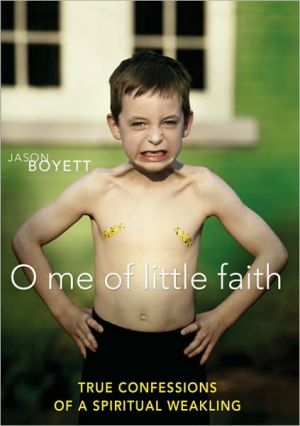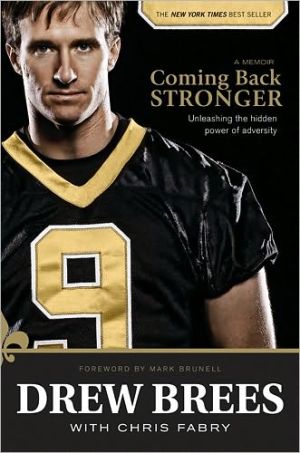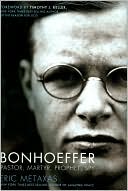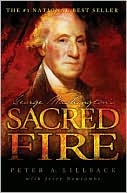O Me of Little Faith: True Confessions of a Spiritual Weakling
In O Me of Little Faith, author Jason Boyett brings you a transparent and personal account of his own of struggles with doubts and unbelief in living out his faith. With humor and frankness, Boyett uses personal anecdotes and a fresh look at Scripture to explore the realities of pursuing Christ through a field of doubt.\ After three decades of knowing God, understanding Christianity, and living a Christian life, Boyett has come to the place where he can voice the tough questions and travel...
Search in google:
O Me of Little Faith is a brutally honest, frequently hilarious look at the struggles of a self-confessed spiritual weakling. Jason Boyett invites you to ask the hard questions and remain hopeful as he examines how you doubt, why you doubt, and what (if anything) should be done about it. Publishers Weekly Doubt can play an important role in a healthy spiritual life. This statement may seem counter-intuitive, but Boyett, popular speaker and author of Pocket Guide to the Afterlife, illustrates its truth through his own faith struggles. Grounded in Scripture and Christian history, the author provides examples of great religious thinkers who experienced their own trials of doubt about God, faith, and the church. But it is when he weaves in humorous, even poignant, autobiographical anecdotes that his writing springs to life. One fascinating highlight is the discussion regarding the "hidden God," a phrase used by many great religious figures to describe just how different God is from human categories and understanding. Ultimately, the author's point is clear: if there were no doubt, there would not be faith. The author is comfortable with a snarky, self-deprecating style that will appeal to the under-40 crowd, although older readers may not appreciate it. For anyone wrestling with doubt about religious faith, however, this memoir provides a chance to examine the experience with levity. (May)
O Me of Little Faith\ True Confessions of a Spiritual Weakling \ \ By Jason Boyett \ Zondervan\ Copyright © 2010 Jason Boyett\ All right reserved.\ ISBN: 978-0-310-28949-4 \ \ \ Chapter One\ The Weakling in the Weight Room \ When I was in seventh grade, there was one room on campus that I approached with dread: the weight room. I played on the basketball team-actually, played might be a bit of a stretch. I was on the basketball team. But as a five-foot, seventy-pound stick of a twelve-year-old, my primary position was holding down the end of the bench. On the "B" team.\ Anyway, during the off-season, our coach decided we needed to start lifting weights. The first part of our weight training would be something he called "maxing out," which sounded awesome until I found out what it really meant. "Maxing out" means finding the heaviest amount of weight a person can lift in one single, clean, complete movement. It is, to a considerable degree, not that awesome.\ I am a skinny, skinny person. Other than a few months of infant obesity, I have been skinny all of my life. My mom's side of the family is populated by healthy-and very thin-people, so I come by my slenderness naturally. I can't wear a regular men's wristwatch because the size of most watch faces make me look like I've strapped a wall clock to my arm. I was scrawny in junior high, and I am scrawny now.\ Coach's plan was for us to max out on the bench press, and he let the big guys go first. They were intimidating enough already. Their deep voices and hairy legs indicated they were already members of the Puberty Club. (Alas, I had not yet received my invitation, and I was beginning to wonder whether I was even on the mailing list.) One by one, while the rest of us watched, the big guys methodically added weight to the bar-clank ... clank. Some of them were getting up into the triple digits, pressing 110, 120, even 130 pounds.\ I thought about hiding under a wrestling mat.\ I went last. Coach turned to me and asked, "Boyett, what do you weigh?"\ "Sev-seventy pounds," I squeaked. (My voice hadn't changed yet.)\ "We'll start with forty-five and work up to seventy," Coach said. "You ought to be able to bench at least seventy."\ Let me pause here to reveal two important facts. The first is that Coach was under the mistaken assumption that a person should be able to bench at least his own body weight, because a bench press is like an inverted upside-down push-up. I dispute this idea even to this day. It just seems wrong.\ You should also know that Coach didn't just choose the beginning forty-five-pound weight at random. Forty-five pounds was the weight of the empty bar.\ That's right: I would start the process of maxing out with just the weight bar. No clanking weights. Just the bar. And, yes, it looked as wildly heroic as it sounds.\ I lay down on the bench. My shirtsleeves slid back to reveal bony arms and nearly hairless armpits. A couple of spotters effortlessly lifted the bar from the rack. I lowered it down, said a quick prayer-please please please let me push this back up-and contracted every pectoral muscle fiber I had. And slowly, steadily, keeping my eyes closed so they didn't pop out of my head with the strain, I pressed that forty-five-pound bar until my quivering arms extended fully. I'd made it. Flush with relief, I breathed again.\ "Nice job, Boyett," Coach said. "Add ten."\ Clank. Clank.\ The spotters loaded a five-pound weight onto each end of the bar. Total: fifty-five pounds. They waited until I steadied my small-boned jelly arms, and let go as I lowered the bar to my chest.\ I pushed. I pushed some more. I squeezed my eyes even tighter. Dear God, I may have prayed, please let there be some sort of Spirit-of-the-Lord Samson strength stored in my blond mullet. I kept pushing. I came dangerously close, I think, to rupturing a disc. My back lifted off the bench, which is not recommended. But the bar wouldn't move.\ "Help him," Coach finally said, and the spotters-I'm certain of this-rolled their eyes at each other as they used their pinkie fingers to lift the bar from my chest. I couldn't move.\ "Boyett: forty-five pounds," Coach called out as he wrote it on his clipboard. His voice echoed against the brick walls and wood floors of the weight room, punctuated by my still-pounding heartbeat.\ I don't blame him for what he said next, because who could resist?\ "On the bench press, Boyett maxes out with ..." (dramatic pause) "... the bar. Just the bar."\ I learned a lot during that season of seventh-grade basketball. I learned the Lord's Prayer, because Coach-a U.S.-born Hispanic Catholic-would have us kneel and say it prior to every game, in the King James Version.\ I also learned (but never practiced) a variety of creative ways to curse, because Coach would typically follow the pre-game Lord's Prayer with a halftime litany of less-appropriate uses of God's name and certain other syllables. Our team wasn't very good, and his way of dealing with our constant failure was to string together as many expletives as he could fit between breaths. I'm convinced the guy was a savant of vulgarity.\ Back then, I learned something about myself that remains true to this day: I am weak. In seventh grade, that weakness was primarily physical. I became aware of it in the weight room, on the basketball court, and in the hallways when various members of the athletic staff kept suggesting that I would make a great equipment manager for the football team.\ Now, a couple of decades later, I wonder if that weakness transferred from the outside to the inside. Some days, when it comes to faith, I can't bench press much more than the bar. I'm spiritually scrawny. I don't measure up to the power-lifters in the weight room.\ When you live and work within the American Christian subculture-especially the less liturgical, more conservative, evangelical, megachurch sub-subculture-you hear a lot of people talking casually about the intimacy of their relationship with God. The way they tell it, they get frequent, distinct impressions from the Holy Spirit. They get personal promptings from Jesus. They get very specific answers to prayer and detailed directions about even the most trivial aspects of their lives.\ I've heard someone tell a friend, "I woke up in the middle of the night and thought of you, and it was definitely the Holy Spirit wanting me to pray for you right then and there." I've overheard a middle-aged woman say, "It was totally a God thing that my flight got cancelled, because I got to share my faith with the lady next to me. Talk about a divine appointment!"\ I've heard musicians credit God with having written their song lyrics. I've heard businessmen give God credit for finally coming through with the promotions for which they'd been praying. I know a few people who don't hesitate to reveal that God told them to quit their jobs and go into full-time ministry.\ One Sunday I overheard someone give this breathless recap of a worship service: "The Lord totally showed up in church this morning. When we got to that key change in 'Breathe,' you just knew God was moving."\ You've heard this kind of talk too, maybe coming out of your own mouth. Please understand me: I'm not telling you-or them-to stop. I'm pretty sure most of those kinds of statements express a sincere and real faith in a personal God who is intimately involved in our lives. That people talk this way is not what bothers me.\ The problem is that I can't describe my own faith that way. It doesn't feel right. It makes me uncomfortable. When I'm around people who do talk that way, it's seventh grade all over again.\ Maybe I'm just a cynical grump. Maybe these Christians aren't spiritualizing chance, or common sense, or feelings, or inner desires by wrapping them in church talk. Maybe they're truly hearing from God. Maybe that's the experience of most Christians today, and I'm just missing out.\ But the God-whispering-in-my-ear thing doesn't seem to happen for me. If I hear my conscience, I'm pretty sure that's because I'm familiar enough with the teachings of Jesus that I feel guilty when I've failed in some way. If I wake up in the night, I'm more likely to believe it's because my dog made a noise than to assume God wants me to pray for someone. (And why does God need me to pray for something so badly that he has to wake me up, anyway? Can't he just wait until morning? Or, you know, answer the prayer without me? Am I a soulless twit to even ask?)\ If my flight gets canceled, perhaps it's just the result of a backlog of delayed flights thanks to a major storm somewhere. I'm seriously hesitant to assume a master evangelistic plan behind flight delays, but many well-meaning Christians really do place so much value on a single soul that they have no problem believing that God whipped up a thunderstorm over the Dallas/Fort Worth airport, piled stress on airline employees, and inconvenienced hundreds of travelers for the purpose of engineering a conversation of eternal significance. My honest assessment of most "divine appointment" language is that it is self-centered. Especially if your divinely appointed evangelism is at the expense of a bunch of other people who just want to get home in time to tuck in their kids. (Right: I'm a soulless twit.)\ If I feel an optimistic swell of "the Spirit" during a specific song at church, maybe it's just that music has a powerful pull on my emotions-a well-timed minor 7th tends to have that effect. Or maybe it's the sound of hundreds of voices singing in unison that gives me chills. Is there any chance that I've been conditioned, in the subtle Pavlovian anticipation of what happens at church, to view this feeling as the presence of God-as God "showing up"? (Anyway, isn't God omnipresent? Can an omnipresent deity ever really "show up" anywhere?)\ Am I too skeptical? Too worldly? Not spiritual enough? Yes. Probably. Almost certainly. At church, in my home group, and in random conversations with fellow Christians, I often feel like my scrawny twelve-year-old self, barely able to lift the bar when everyone else is maxing out in the triple digits. I'm a spiritual lightweight.\ Do I lack the eyes to see and the ears to hear? Is God really trying to speak to me through my canceled flight or my recent insomnia-only I'm just missing it? Sometimes I wonder. I'm full of uncertainty, but I know this for sure: these doubts aren't fun. It's a drag to feel so spiritually weak when everyone else seems strong, to feel so full of doubt when everyone else oozes faith. At church and around Christians, I'm sitting at the end of the bench while the game goes on without me.\ But I love the Bible. I love the Jesus revealed in the Bible. On most days, I'm convinced that he rose from the dead and that he is who he claimed to be. I try to follow him. I try to keep his commandments. I think the life he models is the best way to live. I think the kingdom he invites me into is as revolutionary as they come. But I'd be lying if I said Jesus talked to me all the time, or that he always felt as real to me as my wife and kids do. Because he doesn't.\ "Doubt" is my middle name.\ Not literally, but close enough: I'm Jason Thomas Boyett.\ I'm named after my dad, but we share a name with history's most famous doubter, the disciple Thomas. He didn't fit in either. Thomas's story is found in John 20. After Jesus has died, been buried, and is resurrected, he appears to Mary Magdalene outside the tomb. Later, along the road to Emmaus, Jesus spends time with a couple of followers who don't recognize him at first. Then Jesus surprises his disciples when he suddenly appears in a room with locked doors. He shows them his crucifixion wounds. The disciples believe, and Jesus breathes the Holy Spirit upon them (John 20:19-23). To risk making the biggest understatement in Christian history, I suspect this was an amazing spiritual experience, holy and unexpected. The room must have been saturated with "the power and the glory," to quote the prayer I learned in seventh-grade basketball.\ But Thomas missed the party somehow. According to John 20:24-25, he wasn't there. All his friends leave the locked room rejoicing and saying, "We have seen the Lord!" and eventually they meet up with Thomas. They tell him all about their risen Savior, his still-visible wounds, the locked-room trick, and how wonderful it was.\ Thomas can't rejoice with them, though. He feels confused about the whole thing. And left out. He simply can't relate to what they're saying because he hasn't experienced it. Are his friends drunk? Are they delusional? Are James and John trying to "punk" him or something? Thomas needs proof. He needs to see Jesus for himself and stick his finger in the wounds. He just can't force himself to believe something unbelievable.\ I feel for Thomas. I feel like Thomas.\ I am Thomas.\ One of the earliest and most important deities in Roman mythology is Janus, the two-faced god of doors, gates, beginnings, and endings. He's typically shown with the two faces looking in opposite directions, which is why the month of January takes its first-of-the-year position and name from him. You wouldn't want to meet Janus in person, though-which face would you talk to? Where do you look? A conversation with Janus would be awkward.\ Like Janus, my doubt is an awkward, two-faced freak. One face surveys the many ways I do and do not experience God. It's as suspicious as Thomas. It needs evidence. It wants something rational to hold onto-and sometimes rational proof isn't even convincing enough. It asks questions, but they're the kinds of honest questions that maybe all Christians ask at some point in their lives.\ But there's another face, too. It's rougher, wilder, and more primitive, with a touch of the crazy eyes. It stares down a dangerous, dark path. It's not concerned with biblical contradictions, the silly ways Christians talk, or the trivia of faith. With fear and trembling, it dares to ask a more basic question.\ Does God even exist?\ \ \ \ \ Excerpted from O Me of Little Faith by Jason Boyett Copyright © 2010 by Jason Boyett. Excerpted by permission.\ All rights reserved. No part of this excerpt may be reproduced or reprinted without permission in writing from the publisher.\ Excerpts are provided by Dial-A-Book Inc. solely for the personal use of visitors to this web site. \ \
Contents Acknowledgments....................8Introduction: The Doubter's Road....................111. The Weakling in the Weight Room....................232. Turtles All the Way Down....................353. Are You Sure? Are You Sure You're Sure?....................604. The Weight of Absence....................815. Reverse Bricklaying....................1016. Insanity at 900 Feet....................1247. This Is Horrible. Here, Taste It!....................1468. The Paralysis of Weddings and Births....................1659. Faith with a Kung Fu Grip....................18110. Unresolved....................202About the Author....................223
\ Publishers WeeklyDoubt can play an important role in a healthy spiritual life. This statement may seem counter-intuitive, but Boyett, popular speaker and author of Pocket Guide to the Afterlife, illustrates its truth through his own faith struggles. Grounded in Scripture and Christian history, the author provides examples of great religious thinkers who experienced their own trials of doubt about God, faith, and the church. But it is when he weaves in humorous, even poignant, autobiographical anecdotes that his writing springs to life. One fascinating highlight is the discussion regarding the "hidden God," a phrase used by many great religious figures to describe just how different God is from human categories and understanding. Ultimately, the author's point is clear: if there were no doubt, there would not be faith. The author is comfortable with a snarky, self-deprecating style that will appeal to the under-40 crowd, although older readers may not appreciate it. For anyone wrestling with doubt about religious faith, however, this memoir provides a chance to examine the experience with levity. (May)\ \ \ \ \ ZondervanDoubt can play an important role in a healthy spiritual life. This statement may seem counter-intuitive, but Boyett, popular speaker and author of Pocket Guide to the Afterlife, illustrates its truth through his own faith struggles. Grounded in Scripture and Christian history, the author provides examples of great religious thinkers who experienced their own trials of doubt about God, faith, and the church. But it is when he weaves in humorous, even poignant, autobiographical anecdotes that his writing springs to life. One fascinating highlight is the discussion regarding the 'hidden God,' a phrase used by many great religious figures to describe just how different God is from human categories and understanding. Ultimately, the author's point is clear: if there were no doubt, there would not be faith. The author is comfortable with a snarky, self-deprecating style that will appeal to the under-40 crowd, although older readers may not appreciate it. For anyone wrestling with doubt about religious faith, however, this memoir provides a chance to examine the experience with levity. (May) Jason Boyett, Zondervan -- Zondervan \ \








